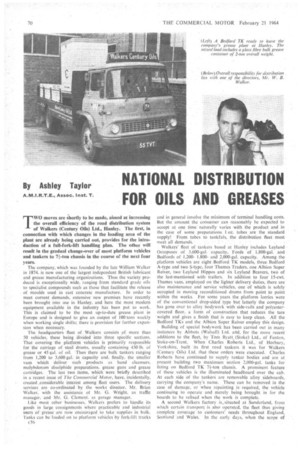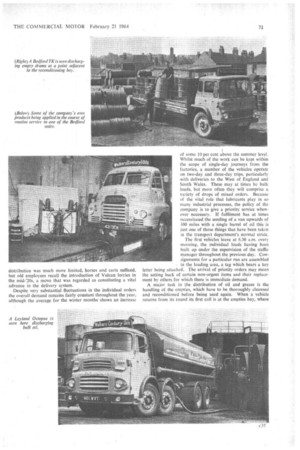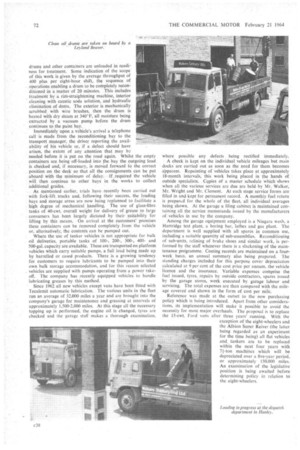By Ashley Taylor NATIONAL DISTRIBUTION A.IVI.I.R.T.E., Assoc. Inst. T. FOR
Page 72

Page 73

Page 74

If you've noticed an error in this article please click here to report it so we can fix it.
OILS AND GREASES TWO moves are shortly to be made, aimed at increasing the overall efficiency of the road distribution system of Walkers (Century Oils) Ltd., Hanley. The first, in connection with which changes in the loading area of the plant are already being carried out, provides for the introductionof a full-fork-lift handling plan. The other will result in the gradual change-over of most platform vehicles and tankers to 71-ton chassis in the course of the next four
years. .
The company, which was founded by the late William Walker in 1874. is now one of the largest independent British lubricant and grease manufacturing organizations. Thus the variety produced is exceptionally wide, 'ranging from standard grade oils to specialist compounds such as those that facilitate the release of moulds used in cast concrete manufacture. In order to meet current demands, extensive 'new premises have recently been brought into use in Hanley, and here the most modern equipment available in the industry has been put to work. This is claimed to be the most up-to-date grease plant in Europe and is designed to give an output of 100 tons weekly when working single shifts; there is provision for further expansion when necessary.
The headquarters fleet of .Walkers consists of more than 50 vehicles, these being divided into three specific sections. That covering -the platform vehicles is primarily responsible for the carriage of steel drums, usually containing 450 lb. of grease or 45 gal. of oil. Then there are bulk tankers ranging from 1,200 to 3,600 gal. in capacity and, finally, the smaller vans which deliver such products as hand cleansers, molybdenum disulphide preparations, grease guns and grease cartridges. The last two items, which were briefly described in a recent issue of The Commercial Motor, have, incidentally, created considerable interest among fleet users. The delivery services are co-ordinated by the works director, Mr. Brian Walker, with the assistance of Mr. Q. Wright, as traffic manager, and Mr. G. Clement, as garage manager.
1.ike moSt other businesses, Walker's prefers to handle its goods in large consignments where practicable and industrial users of grease are now encotiriiged to take supplies in bulk. Tanks can be loaded on to platform vehicles by fork-lift trucks c36
and in general involve the minimum of •terminal handling costs. But the amount the consumer can reasonably he expected to accept at one time' naturally varies with the product and in the case of some preparations 1 oz. tubes are the standard supply! From tubes to tankfuls, the distribution fleet must
meet all demands. . • . .
Walkers' fleet of tankers based at Hanley includes Leyland" Octopuses of 3,600-gal: capacity, Fords of 1,800-gal. and Bedfords of 1,2001,800and 2,000-gal. capacity. ,Among the platform vehicles are eight Bedford TK models, three. Bedford A-type and two S-type, four Thames Traders, one Albion Super Reiver, two Leyland Hippos and six Leyland Beavers, two of the last-mentioned with trailers. In addition to four 15-cwt. Thames vans, employed on the lighter delivery duties, there are also maintenance and service .vehicles, one of which is solely occupied in moving reconditioned drums from point to point within the works. For some years the platform lorries were of the conventional drop-sided type but latterly the company has gone over to alloy bodywork with side-rails and polyestercovered floor, a form of construction that reduces the tare weight and gives a finish that is easy to keep clean. All the Bedford TKs and the Albion Super Reiver employ this design.
Building of special bodywork has 'been carried out in many instances by Abbots (Walsall) Ltd. and, for the more recent additions to the fleet, by Torn Byatt_ (Stoke) Ltd„ of Fenton, Stoke-on-Trent. When Charles Roberts Ltd., of Horbury, Yorkshire, built its first road tankers it was for Walkers (Century Oils) Ltd. that these orders were executed. Charles Roberts have continued to supply tanker bodies and are at present building two maximum section 2,000-gal, tanks for fitting on Bedford TK 7+-ton chassis. A prominent feature of these vehicles is the illuminated headboard over the cab. At each side of the tankers are removable alloy sideboards, carrying the company's name. These can be removed in the case of damage, or when repainting is required, the vehicle continuing to operate and merely being brought in for the boards to be refixed when the work is complete.
A second Walkers factory is.,situated at Sunderland, from which certain transport is also operated, the fleet thus giving complete coverage to customers' needs throughout England, Scotland 'and Wales: In the, early days, when the scope of
distribution was much more limited, horses and carts sufficed, but old employees recall the introduction of Vulcan lorries in the mid-'20s, a move that was regarded as constituting a vital advance in the delivery system.
Despite very substantial fluctuations in the individual orders the overall demand remains fairly constant throughout the year, although the average for the winter months shows an increase
of some 10 per cent above the summer level. Whilst much a the work can be kept within the scope of single-day journeys from the factories, a number of the vehicles operate on two-day and three-day trips, particularly with deliveries to the West of England and South Wales. These may at times be bulk loads, but more often they will comprise a variety of drops of mixed orders. Because of the vital role that lubricants play in so. many industrial processes, the policy of the company is to give a priority service whenever necessary. If fulfilment has at times necessitated the sending of a van upwards of 100 miles with a single barrel of oil this is just one of those things that have been taken in the transport department's normal stride.
The first vehicles leave at 6.30 a.m. every morning, the individual loads having been built up under the supervision of the traffic manager throughout the previous day. Consignments for a particular run are assembled . in the loading area, a tag which bears a key letter being attached. The arrival of priority orders may mean the setting back of certain non-urgent items and their replacement by others for which there is immediate demand.
A major task in the distribution of oil and grease is the handling of the empties, which have to be thoroughly cleansed and reconditioned before being used again. When a vehicle returns from its round its first call is at the empties bay, where
drums and other containers are unloaded in readiness for treatment. Some indication of the scope of this work is given by the average throughput of 400 plus per eight-hour shift, the sequence of operations enabling a drum to be completely reconditioned in a matter of 20 minutes. This includes treatment by a rim-straightening machine, interior cleaning with caustic soda solution, and hydraulic elimination of dents. The exterior is mechanically scrubbed with wire brushes, then the drum is heated with dry steam at 340°F, all moisture being extracted by a vacuum pump before the drum continues to the paint bay..
Immediately' upon a vehicle's arrival a telephone call is made from the reconditioning bay to the transport manager, the driver reporting the availability of his vehicle or, .if a defect should have arisen, the extent of any attention that may be needed before it is put on the road again. Whilst the empty containers are being off-loaded into the bay the outgoing load is checked and, if necessary, is moved, forward to the correct positiOn on the deck so that all the consignments can be put aboard: with the 'minimum of delay: -If .required the vehicle will then continue to other bays in the works to collect additional grades...
As mentioned earlier, trials have recently been carried out with fork-lift trucks and, following their success, the loading bays and storage areas are now being replanned to facilitate a high degree of mechanical handling. The use of glass-fibre tanks of 40-cwt. overall weight for delivery of grease to large consumers has been largely dictated by their suitability for lifting by this means. On arrival at the customers' premises these Containers can be removed completely.from the vehicle or, alternatively, the contents can be pumped out.
Where the use of tanker vehicles is not appropriate for bulk oil deliveries, portable tanks of 100-, 200-, 300-, 400and 500-gal. capacity are available. These are transported on platform vehicles which carry suitable pumps, a full load being made up by barrelled or cased products. There is a growing tendency for customers to require lubricants to be pumped into their own bulk storage accommodation, and for this reason selected vehicles are supplied with pumps operating from a power takeoff. The company -has recently equipped vehicles to handle lubricating greases by this method.
• Since 1962 all new vehicles except vans have been fitted with Tecalemit automatic lubrication. The various units in the fleet run an average of 32,000 miles a year and are brought into the company's garage for maintenance and greasing at intervals of approximately 1,500-2,000 miles. At this stage all the necessary topping up is performed, the engine oil is changed, tyres are checked and the garage staff makes a thorough examination, where possible any defects being rectified immediately,
A check is kept on the individual vehicle mileages but main docks are carried out as soon as the need for them becomes apparent. Repainting of vehicles takes place at approximately I8-month intervals, this work being placed in the hands of outside specialists. Cqpies of a master schedule which shows when all the various services are due are held' by Mr. Walker, Mr. Wright and Mr. Clement. At each stage service forms are filled in and kept for permanent record. A monthly fuel' return is prepared for the whole of the fleet, all individual averages being shown. At the garage a filing cabinet is maintained contaming all the service memoranda issued by the manufacturers of vehicles in use by the company.
Among the garage equipment employed is a Niagara wash, a Hartridge test plant, a boring bar, lathes and gas plant. The department is well supplied with all spares in common use, including a suitable quantity of sub-assemblies. Reconditioning of sub-units, relining of brake shoes and similar work, is performed by the staff whenever there is a slackening of the maintenance prcfgrarnme. Costing records.,are maintained on a fourweek basis, an annual summary also being prepared. The standing charges included for this purpose cover depreciation calculated at 9 per cent of the cost price per annum, the vehicle licence and the insurance. Variable expenses comprise the fuel issued, tyres, repairs by outside contractors, spares issued by the garage stores, work executed by garage labour and servicing. The total expenses are then compared with the mileage covered and .shown in the form of cost per mile.
Reference was made at the outset to the new purchasing policy which is being introduced. Apart from other considerations, its implementation will make it possible to avoid the necessity for most major overhauls. The proposal is to replace the 15-cwt. Ford vans after three years' running, With the exception of the eight-wheelers and the Albion Suner Reiver (the latter being regarded as an experiment for the time being) all flat vehicles and tankers are to be replaced within the next' four years with 71-ton machines . which will be depreciated over a five-year period, or approximately 150,000 miles. An examination of the legislative position is being awaited before determining policy in relation to the eight-wheelers,
























































































































